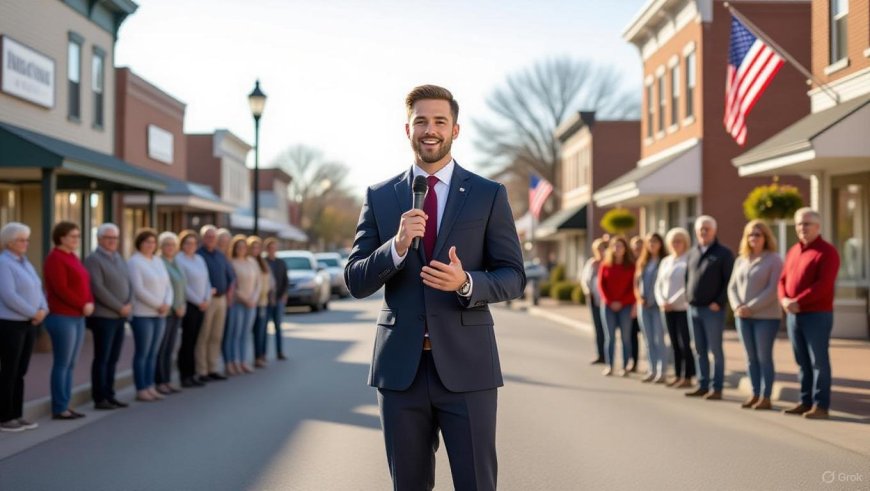The Gen Z Wave: How Young Mayors Are Redefining Small-Town America
Gen Z mayors in small-town America are reshaping local politics with progressive policies, digital governance, and youth engagement, challenging traditional leadership models.

In the heart of small-town America, a new kind of leadership is emerging—one defined by social media fluency, progressive policies, and the determination to challenge long-standing traditions in local governance. Generation Z, the first digital-native generation, is beginning to leave its mark on American politics. And nowhere is this more evident than in the rise of Gen Z mayors in towns that once seemed immune to youthful political shake-ups.
From College Campuses to City Hall
At just 25, Jaylen Smith, mayor of Earle, Arkansas, became one of the youngest mayors in U.S. history. His election was more than a headline; it was a sign of shifting political engagement in small communities. Smith has pushed for infrastructure improvements, youth employment initiatives, and town beautification projects, often bringing a fresh perspective to challenges long ignored.
Similar stories are unfolding across the country. In towns in Wisconsin, Ohio, and Kentucky, Gen Z leaders are prioritizing issues like affordable housing, climate resilience, and mental health services—topics traditionally overlooked at the local level.
“We’re proving that young people can govern seriously, even in communities where politics has been seen as an old guard,” Smith said in a recent interview.
Policy Innovations from a New Generation
What sets Gen Z mayors apart is not just their age but their willingness to experiment with policy.
-
Digital Governance: Many young mayors are implementing online town halls and mobile apps for reporting civic issues, increasing transparency and accessibility.
-
Sustainability Initiatives: In small Midwestern towns, Gen Z leaders are investing in renewable energy partnerships and community gardens to reduce costs and promote sustainability.
-
Youth Engagement: Programs aimed at high school and college students are bringing younger residents into civic life earlier, creating pipelines for future local leaders.
These initiatives reflect a generation more comfortable with technology and more willing to borrow policy ideas from global models rather than relying solely on local precedent.
Community Reactions: Tradition Meets Change
Not all residents welcome this new style of leadership. In conservative-leaning rural towns, some Gen Z mayors face resistance from older constituents skeptical of progressive policies.
“We’ve always done things a certain way here,” said Mark Reynolds, a retired farmer from a small Iowa town. “It’s hard to take advice from someone younger than my grandchildren.”
Yet others see hope in the shift. Younger leaders have energized civic participation, with voter turnout among under-30 residents climbing in towns that elect Gen Z officials. Business owners, too, have begun to embrace policies promoting local entrepreneurship and digital infrastructure upgrades.
National Relevance of Local Leadership
Though these mayors preside over towns with populations sometimes under 10,000, their influence extends well beyond municipal boundaries. They represent a generational change in American politics—one that could reshape state and national elections in years to come.
According to Pew Research Center, Gen Z is the most racially diverse, socially progressive, and politically engaged generation to date. Their entry into local governance may serve as a testing ground for ideas that could soon enter national platforms.
Political scientists suggest that the success—or failure—of these young leaders will determine whether Gen Z can maintain momentum in political spheres traditionally resistant to change.
Challenges Ahead
The road is not without obstacles. Limited budgets, entrenched political rivalries, and skepticism from older colleagues often constrain what young mayors can accomplish. Some struggle with the perception of inexperience, particularly when navigating complex issues like zoning laws or municipal finance.
Still, many remain undeterred. “If anything, being young is an advantage,” said Ava Thompson, a 27-year-old mayor in Ohio. “We’re not beholden to old ways of doing things. We can innovate faster.”
A Growing Trend
The presence of Gen Z mayors is no longer a novelty but an emerging pattern. As more young candidates enter politics through school boards and city councils, it seems inevitable that the number of Gen Z mayors will grow. Their rise underscores a broader truth: local governance is becoming a proving ground for America’s next generation of leaders.
What's Your Reaction?
 Like
0
Like
0
 Dislike
0
Dislike
0
 Love
0
Love
0
 Funny
0
Funny
0
 Angry
0
Angry
0
 Sad
0
Sad
0
 Wow
0
Wow
0








































































